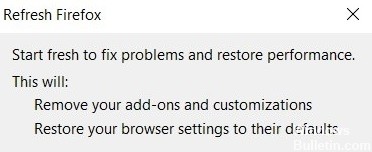Updated April 2024: Stop getting error messages and slow down your system with our optimization tool. Get it now at this link

When you use the Firefox browser, it consumes more memory and uses high CPU resources to display web content or download anything from the Internet.
If you are experiencing similar issues and are frustrated with high memory consumption when using Firefox, this post provides some effective ways to fix the issues.
What causes high CPU load in Firefox?

- Faulty extensions and themes
- Faulty hardware acceleration
- Not enough RAM in your system
- Defective content-prefs.sqlite file
- Powerful processes running in Firefox.
How to fix high Firefox CPU load?
You can now prevent PC problems by using this tool, such as protecting you against file loss and malware. Additionally it is a great way to optimize your computer for maximum performance.
The program fixes common errors that might occur on Windows systems with ease - no need for hours of troubleshooting when you have the perfect solution at your fingertips:
April 2024 Update:

Restart Firefox
- Copy about:support into the Firefox address bar and press the “Enter” key. This will take you to the Troubleshooting page.
- Click on the Refresh Firefox button on the right. A confirmation dialog box will open.
- Click on the Refresh Firefox button.
- Wait for the operation to complete and restart your Firefox browser.
Turn on hardware acceleration
- Launch Firefox on your computer.
- Click on the menu and select Preferences.
- Scroll to the Performance section of the General tab.
- Turn off the ‘Use recommended performance settings’ option.
- Enable the ‘Use hardware acceleration‘ option, if available.
Use strict anti-tracking protections
- Launch the Firefox browser on your computer.
- Click on the menu and select Preferences.
- Go to Privacy and Security on the left menu bar.
- Under Advanced anti-tracking protection, select Strict Mode.
- Now check to see if this gives a positive result.
Launch Firefox in Safe Mode
- Launch the Mozilla Firefox browser.
- Click on the menu in the top right corner.
- From the drop-down list, select Help -> Restart with Add-ons Disabled.
- This will launch the browser in safe mode.
Expert Tip: This repair tool scans the repositories and replaces corrupt or missing files if none of these methods have worked. It works well in most cases where the problem is due to system corruption. This tool will also optimize your system to maximize performance. It can be downloaded by Clicking Here
Frequently Asked Questions
Why is Firefox consuming so much CPU?
Firefox's high CPU usage is mainly due to parsing large site elements and background processes. This can be fixed by optimizing your browser configuration and not using many third-party add-ons running in the background.
What can I do about my browser’s CPU usage?
- Keep your browser up to date.
- Keep fewer tabs open.
- Disable unwanted apps and extensions.
- UseTask Manager to monitor CPU/memory usage.
- Stop background apps.
- Turn on hardware acceleration.
- Restore browser's default settings.
How can I stop Firefox from consuming so much CPU?
- Update to the latest version.
- Restart Firefox.
- Restart your computer.
- Disable extensions and themes that consume resources.
- Hide intrusive content.
- Use fewer tabs.
- Check Firefox's hardware acceleration.
- Close other applications.


